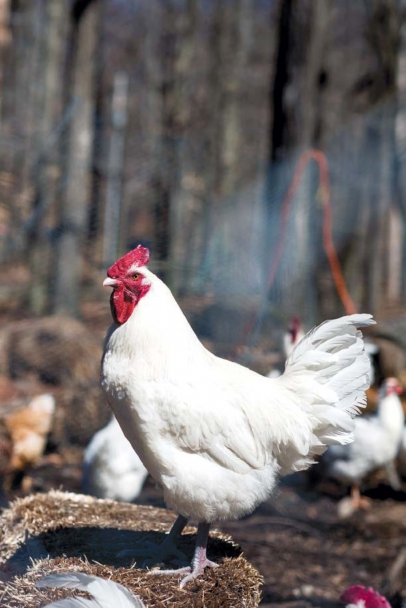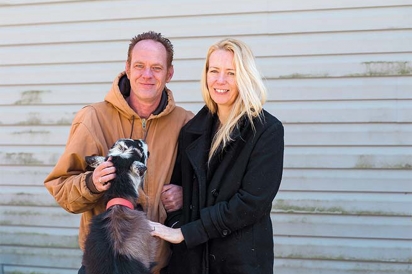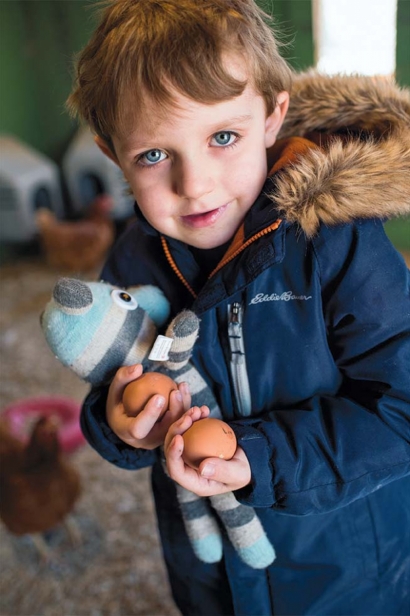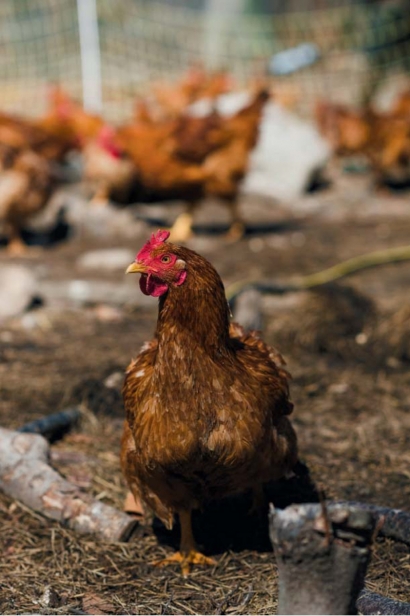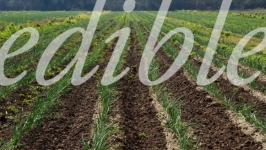Bresse of Blairstown: A Chicken of Tradition
In the wooded hills of Hardwick, just south of the Appalachian Trail, 20 white chickens with scarlet combs and dark-blue feet peck at the grass sprouting up through the leaves. It’s early May, and Voodoo Farm’s most elite flock has just been rotated into a fresh patch of woods, in time for the first eggs of the season to hatch. They’re known as American Bresse, and much like California “Champagne”, these American-born birds trace their origin to a particular region of France, where a famous 19th-century gastronome once entitled the breed “queen of chickens, and the chicken of kings.”
It should come as no surprise, then, that the 75 new Bresse joining the flock in 2016 will be treated like queens from the moment they’re born, roaming 15 acres of hilly forest and dining on an all-natural, protein-rich diet of insects, frogs, newts, clover and spoilage from newly planted fruit trees. Voodoo’s owners, Oren and Cybele Ritterband, both first-generation farmers, chose their stock carefully. “When Oren was doing his research, he found the terrain here is very much like the Bresse area in France,” says Cybele, with a nod toward the mountains of nearby Worthington State Forest. “You always see these wonderful farmers with green pastures, but really the natural environment for a chicken is the woods, where they can eat bugs and hide from predator birds.”
The terrain is only the beginning of the French tradition, which the Ritterbands take very seriously. According to French specifications, Bresse must be raised at least four months outdoors, with a minimum 32 square feet of foraging space per chicken—a standard that dramatically exceeds the definition for USDA “free range” poultry, which only specifies that birds be “allowed access to the outside.”
Bresse are offered for sale only in December, following a short period of rest and fattening indoors in large wooden cages called épinettes. During these final weeks, the birds are provided unlimited access to a special mixture of grain and clabbered milk—in this case from Voodoo Farm’s own goats.
The effect is a more tender, juicy meat, albeit of a very different flavor and color than supermarket poultry—the flesh of the Bresse has been called “firm but buttery.” Because the birds are encouraged to find their own food, they live longer, more active lives than commercially raised chickens, which are bred to put on weight fast and are usually slaughtered at less than two months of age. Greater muscle development and lower fat content means that Bresse chicken lends itself to simmering and slow cooking to bring out a delicate smokiness. For quicker cooking methods, a meat thermometer is a must; the chicken remains a raw-looking pink even when cooked to 165˚, the USDA’s recommendation for food safety.
Though Voodoo Farm is a near-perfect replica of the woods of eastern France, and produces a bird that lives, looks, and tastes like its French cousin, it cannot, legally, be sold as Bresse . Like the label “Champagne,” Bresse is granted an Appellation d’Origine Contrôlée, and the breed is restricted to a region of France 60 miles long by 20 wide. As faithful as a farmer might be to the old ways, if the chicken’s not from Bresse, it’s not a Bresse.
Thus the use of the name “American Bresse” for birds descended from Bresse chickens but born on these shores. Greenfire Farms, an importer and breeder of heritage poultry based in Midway, Florida, supplies Voodoo and a handful of other farmers with these birds at $29 a chick. As New Jersey’s only purveyor of American Bresse, Voodoo’s market price is $8 per pound, roughly half the price of imported French Bresse.
For customers hoping for something with enough fat to toss on the grill, or a taste of free-range Highlands chicken without the expense and six-month wait, there is Voodoo’s year-round offering, the Freedom Ranger. Though both breeds enjoy the same forest amenities, raising the rust-colored Ranger requires a fraction of the time and produces a more versatile, if slightly less unusual, meat. The birds reach their peak weight of five to six pounds after nine to 11 weeks and, owing to the Freedom Ranger’s daily exercise, the meat has a deep pink color and bright yellow fat—which contains more omega-3 fatty acids and less saturated fat than commercial broilers. “The color of our chicken is completely different because the muscles are actually used,” Oren says. “When I open the doors of the coop, they come flying out.”
Some 1,000 Freedom Rangers reside at Voodoo at any given time, and once a month, 350 of them are processed for the farm’s CSA and for delivery to local restaurants. All are butchered by hand by the Ritterbands and air-chilled to preserve the natural texture of the meat, whether it’s destined for the oven or the freezer.
Though demand for both breeds is on the rise, the Ritterbands are wary of overproduction. The daughter of a strict vegetarian and the son of a rabbi, Cybele and Oren take pains to slaughter respectfully, in the middle of the night, when the birds are half asleep “I like the part of Judaism that rests on the ethics of kosher,” says Oren, who is not religious but borrows from the kosher tradition. “If you can’t trust the person who’s butchering your meat, everything after is not kosher.”
The couple learned to dress their birds at a chicken processing workshop hosted by Hard Cider Homestead, a small backyard farm in rural East Amwell that gives lessons in butchering, wheat production, garlic braiding and other small-scale farming skills. Initially, the Ritterbands set out to learn because they couldn’t find a butcher who would prepare their Bresse the traditional French way—with the blue feet and white-feathered head and neck intact, for shrewd buyers to easily identify the breed. But they now consider the slaughter a responsibility, both to eliminate the stress of transport on the birds and to keep sight of every part of the process. “That’s why it drives us crazy to throw any piece away,” says Cybele. “I’m not going to throw away the feet or the neck. I’ll keep them in the freezer until someone buys them, or we’ll give them away.”
Even in the freezer, chickens raised at Voodoo Farm have an advantage over store-bought birds, claim the Ritterbands. What destroys the flavor and consistency of a frozen chicken, Oren explains, is not the freezing itself, but the chlorinated water bath that precedes it in most commercial settings. “If you’ve ever eaten gummy, chewy, tasteless chicken, it’s because it’s gone through severe cell damage by being frozen while waterlogged,” Oren says. Air chilling, another piece of the Bresse equation, avoids the water bath altogether, resulting in a more tender, flavorful chicken.
Raised to order for individual customers, and sold exclusively whole, with a tiny metal identification band around the chicken’s foot, the Bresse is treated as a niche market. But the Ritterbands are working hard to expand the reach of their Freedom Ranger CSA, both through local sales and through a new program founded by a former IT salesman in Sussex County with a passion for sustainable farming. It’s called Farm to Office, and places local farmers face-to-face with an unlikely group of potential customers: office workers on their way to the cafeteria.
In March, Oren and Cybele met Farm to Office founder Mitch Morrison, plus the other members of the NJ Highlands Farm to Office program, at the Wyndham Worldwide corporate campus in Parsippany, where they held their first Farm to Office fair. In total, the eight member farms spoke with over 100 employees interested in joining CSAs or learning about local farms.
Oren left the fair impressed, and Voodoo Farm has since signed on to selling chickens through the program. “People like to talk about connecting people with farmers, but very few actually do anything,” Oren says. “Farm to Office is genius. We come to you, you go home with your food, and there’s more interaction between these corporate office parks and the community.”
Indeed it was the support from their own community that first encouraged the Ritterbands when they started Voodoo Farm. “We do such small numbers, the two restaurants in town took such a chance on us,” Cybele says. “The Blairstown Inn—someone who’s been in business for 35 years, who could buy chicken for 69 cents a pound at the wholesale market—came to us and asked for ours.” Since then, the inn has hosted a regular Sunday dinner featuring Voodoo Farm chicken, for which they order ten Freedom Rangers a week.
“Dealing with food is really gratifying,” Oren says, as he checks the birds inside the new hard-sided coop, beside the mangled remains of the temporary one destroyed by a black bear last fall. He remembers the 12-hour days he spent working in film, which have somehow been replaced by even longer days fending off bears and seeding clover patches in the woods. Cybele vaguely mentions having once worked in a museum before she moved to a dairy farm in Vermont and reconnected with a friend from art school in New York whom she hadn’t seen in 24 years. The friend, now her husband, uses the word “evolve,” as he describes the lessons they’ve been taught by a myriad of sources, both human and animal, in the last three years.
“We were very lucky to do things we loved,” Cybele says, over the soft clucking of a hundred birds waiting to be fed, and the ringing of a bell on the collar of a wandering free-range goat, with an escaped rooster following close behind. “But there’s something definitely more satisfying about this.”
Then, to complete the symphony, an outdoor speaker mounted under the coop emits a familiar melody, in the direction of the woods. It’s Mozart.
“I found it during my original search for Bresse,” Oren says. “If you look up farmers play music, a lot of guys swear by it.”
Voodoo Farm
3 Timothy La., Hardwick
908.362.9842
voodoochickenfarm.com


